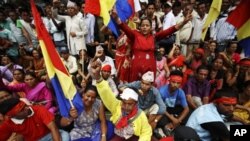In Nepal, thousands of young Nepalese have launched a campaign, using social networking sites, to pressure political parties to draw up a new constitution for the country.
For four straight Saturdays, hundreds of young Nepalese men and women have demonstrated in the capital, Kathmandu, demanding that lawmakers should forego their salaries if they cannot give the country its long overdue democratic constitution.
They are being mobilized through social network sites like Facebook. The campaign, “Nepal Unites,” has been triggered by deep anger with political parties, which have failed to reach a consensus and produce a new constitution.
The constitution was to have been drafted by May 2010, after a bloody civil war ended and the monarchy was abolished. But two deadlines have already been missed. The latest passed on Saturday.
The young, urban elite backing the campaign say they fear that squabbling political parties are endangering the country’s hard-won democracy.
“We are totally apolitical," said Prashant Singh, one of the founders of the Facebook campaign. "We don’t want to promote any kind of violence. We are not trying to derail the political process or by any means belittle the political parties, in general, because we all are believers in democracy and liberal values. It is already democracy, we are just trying to strengthen it."
In less than a month, thousands of young professionals, activists and students have joined the campaign to press lawmakers to complete the transition to democracy. For most of them, this is the first time they have turned out to take part in such protests - whether on the streets or on the net. Their message to lawmakers is simple: “No work, no pay.”
Political analysts say the campaign highlights the deep frustration in the country at the stalled peace process.
Analyst Yuvaraj Ghimire in Nepal says the three major political parties have not even decided on a first draft and have fundamental differences on what system of government to adopt.
“These parties have basically taken a rigid stance, now trying to impose their individual lines to be the ingredients of future constitutions, whereas four years ago when they decided to come together, they had taken a pledge to pursue the political consensus. So from what they said four years ago, and what they are doing now, there is a world of difference,” Ghimire says.
Lawmakers voted Saturday to give parliament a three-month extension to write the constitution. But there are fears that this, too, might be frittered away.
Prashant Singh says, for the next three months, they will keep up the pressure on political parties.
“We are not going to sleep [become distracted] again. Very soon we will have hoardings at very important places of Kathmandu, which is like a countdown, 89 days left, 88 days left and things like that. And, even on Facebook for example, people will change their profile pictures everyday, so it is like a constant reminder that we are awake and we are looking at it,” he says.
The campaigners say their message is hitting home. Many lawmakers had wanted a longer extension to write the constitution, but decided not to risk deepening public anger by giving parliament more than 90 days to complete the task.





